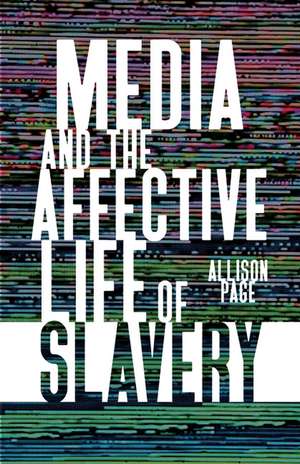Media and the Affective Life of Slavery
Autor Allison Pageen Limba Engleză Paperback – 8 mar 2022
How media shapes our actions and feelings about race
Amid fervent conversations about antiracism and police violence, Media and the Affective Life of Slavery delivers vital new ideas about how our feelings about race are governed and normalized by our media landscape. Allison Page examines U.S. media from the 1960s to today, analyzing how media culture instructs viewers to act and feel in accordance with new racial norms created for an era supposedly defined by an end to legal racism.
From the classic television miniseries Roots to the edutainment video game Mission 2: Flight to Freedom and the popular website slaveryfootprint.org, Media and the Affective Life of Slavery provides an in-depth look at the capitalist and cultural artifacts that teach the U.S. public about slavery. Page theorizes media not only as a system of representation but also as a technology of citizenship and subjectivity, wherein race is seen as a problem to be solved. Ultimately, she argues that visual culture works through emotion, a powerful lever for shaping and managing racialized subjectivity.
Media and the Affective Life of Slavery delivers compelling, provocative material and includes a wealth of archival research into such realms as news, entertainment, television, curricula, video games, and digital apps, providing new and innovative scholarship where none currently exists.
Amid fervent conversations about antiracism and police violence, Media and the Affective Life of Slavery delivers vital new ideas about how our feelings about race are governed and normalized by our media landscape. Allison Page examines U.S. media from the 1960s to today, analyzing how media culture instructs viewers to act and feel in accordance with new racial norms created for an era supposedly defined by an end to legal racism.
From the classic television miniseries Roots to the edutainment video game Mission 2: Flight to Freedom and the popular website slaveryfootprint.org, Media and the Affective Life of Slavery provides an in-depth look at the capitalist and cultural artifacts that teach the U.S. public about slavery. Page theorizes media not only as a system of representation but also as a technology of citizenship and subjectivity, wherein race is seen as a problem to be solved. Ultimately, she argues that visual culture works through emotion, a powerful lever for shaping and managing racialized subjectivity.
Media and the Affective Life of Slavery delivers compelling, provocative material and includes a wealth of archival research into such realms as news, entertainment, television, curricula, video games, and digital apps, providing new and innovative scholarship where none currently exists.
Preț: 211.67 lei
Nou
Puncte Express: 318
Preț estimativ în valută:
40.50€ • 42.37$ • 33.65£
40.50€ • 42.37$ • 33.65£
Carte indisponibilă temporar
Doresc să fiu notificat când acest titlu va fi disponibil:
Se trimite...
Preluare comenzi: 021 569.72.76
Specificații
ISBN-13: 9781517910402
ISBN-10: 1517910404
Pagini: 192
Ilustrații: 3 b&w illustrations
Dimensiuni: 140 x 216 x 15 mm
Greutate: 0.29 kg
Editura: University of Minnesota Press
Colecția Univ Of Minnesota Press
ISBN-10: 1517910404
Pagini: 192
Ilustrații: 3 b&w illustrations
Dimensiuni: 140 x 216 x 15 mm
Greutate: 0.29 kg
Editura: University of Minnesota Press
Colecția Univ Of Minnesota Press
Notă biografică
Allison Page is assistant professor of media studies with a joint appointment in the Institute for the Humanities and the Department of Communication and Theatre Arts at Old Dominion University.
Cuprins
Introduction: Racial Formation and Post–Civil Rights Governance
1. “The Restless Black Peril”: Race, Television Documentary, and Emotion
2. Feeling Slavery: Roots and Pedagogies of Emotion
3. Choosing Freedom: Empathy and Agency
4. “How Many Slaves Work for You?” Algorithmic Governance and Guilt
Conclusion. Refusing Prescription: Kara Walker and Black Feminist Cultural Production
Acknowledgments
Notes
Index
1. “The Restless Black Peril”: Race, Television Documentary, and Emotion
2. Feeling Slavery: Roots and Pedagogies of Emotion
3. Choosing Freedom: Empathy and Agency
4. “How Many Slaves Work for You?” Algorithmic Governance and Guilt
Conclusion. Refusing Prescription: Kara Walker and Black Feminist Cultural Production
Acknowledgments
Notes
Index
Recenzii
"Allison Page’s Media and the Affective Life of Slavery powerfully analyzes how television, film, and new media use slavery to socialize viewers into racialized understandings of American citizenship. Through film, television, apps, and video games, she shows how media representations of slavery underwrote forms of liberal and neoliberal subjectivity. This is one of the most brilliant takes on the intersections between media, affect, citizenship, and race; we would do well to study its insights." —Roderick A. Ferguson, Yale University
"Allison Page’s Media and the Affective Life of Slavery offers a compelling and much needed archival media history of how the national story America tells itself about itself is renewed."—International Journal of Communication
"The core of Media and the Affective Life of Slavery is painful and profound but essential to an understanding of the multidisciplinary legacy and impact of slavery in the culture of the United States."—Information and Culture
"Media and the Affective Life of Slavery is an exciting book that breaks new ground even as it participates in some of the most enduring conversations in the field."—Television and New Media
"Allison Page’s Media and the Affective Life of Slavery offers a compelling and much needed archival media history of how the national story America tells itself about itself is renewed."—International Journal of Communication
"The core of Media and the Affective Life of Slavery is painful and profound but essential to an understanding of the multidisciplinary legacy and impact of slavery in the culture of the United States."—Information and Culture
"Media and the Affective Life of Slavery is an exciting book that breaks new ground even as it participates in some of the most enduring conversations in the field."—Television and New Media
